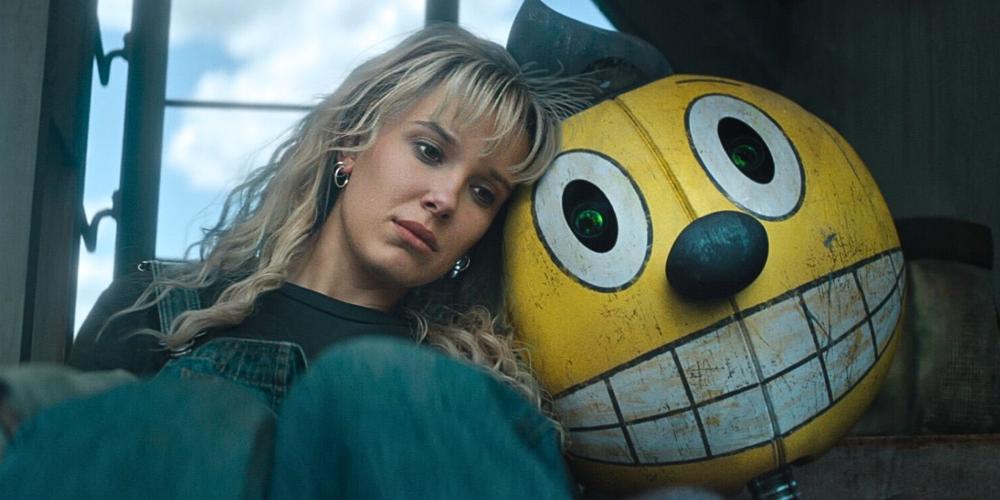Much in the way that comic books or comic-book films do, this feature creates an alternative history. It rewrites the second half of the 20th century. From Walt Disney to Bill Clinton, this film manifests a different timeline where robots have evolved and have their own personalities, meaning an advanced, artificial intelligence exists in the 90's. However, this film also has technology where humans can link their minds to drone robots that can be controlled over what seems like a vast network, despite it being the 90's and there being no cell phones. Not setting this film in the 2020's or even in the future makes all this advanced technology confusing. I simply didn't see the point of establishing us in the 90's.
Millie Bobby Brown (Stranger Things and Godzilla: King of the Monsters) stars as Michelle Green, a young woman whose family died in a car crash. At the same time, a robot revolution occurred where robots began fighting for equal rights or for their freedom. Along side this, Michelle rejects mind-to-drone technology. This technology is called a neurocaster and it's basically a VR headset. Almost everyone uses this headset, but Michelle doesn't want to put on the headset. Therefore, this film has two things it's juggling. One is the robot revolution. The other is the neurocaster technology and the implications of that.

Chris Pratt (Jurassic World and Guardians of the Galaxy) co-stars as John Keats, a soldier in the war against the robots. Now that the war is over, he's living in exile in the desert, surviving in the black market because he doesn't agree with how robots are treated in society. Robots are discriminated in society and Keats doesn't agree. His role is more about exploring this whole robot revolution and robot rights, which could've been a metaphor for workers rights in general or xenophobia. It also allows for robot battles. In terms of this story line, it's less engaging because instead of developing it organically. A montage that mimics news footage is supposed to tell the history of robot rights, but the montage wasn't really enough.
The film doesn't show us or make us feel why the robots are fighting for their freedom. It seems like the robots developed emotions and a soul for lack of a better word, but how or what their greater purpose would be is never explored. The problem is that we never get to know the robots. Yes, we're introduced to these living machines, including a Mr. Peanuts-looking robot, voiced by Woody Harrelson, but delving into Mr. Peanuts and understanding who he is beyond wanting "freedom" because freedom to do what?

Stanley Tucci (Conclave and The Hunger Games) also co-stars as Ethan Skate, the inventor of the neurocaster. The technology seems incredible and there's no clue how people can afford it. There's a shot of what looks like a homeless man wearing a neurocaster and one questions how he could afford it, if he's homeless. There could be an implication that obsessing over the neurocaster made him homeless, but other than that one shot, the film doesn't explore that aspect. Ethan pushes this neurocaster much like a Mark Zuckerberg pushing his Metaverse.
The film pushes this idea at the end of people unplugging from technology like the neurocaster, going outside and being in person with other people. This could be a critique of social media and how people, especially young people, should disconnect from their phones. Yet, the film is also juggling the robots rights, so it barely has space for this unplugging from tech angle. Unplugging from tech has some resonance, but it falls flat because the film doesn't spend much time on it.

I guess it should be noted that it's only March but there are two actors here who both are showcasing their second feature. Emmy-nominee Giancarlo Esposito (The Mandalorian and Breaking Bad) was in last month's Captain America: Brave New World (2025). Oscar-winner Ke Huy Quan was also in last month's Love Hurts (2025). Other than having recognizable faces, there's nothing new or interesting about either of their performances here. The filmmakers, Anthony & Joe Russo probably wanted famous faces and got them. Because they directed Avengers: Endgame (2019), one of the biggest films in the world, they're able to get whomever they want.
Speaking of which, the Russo brothers also wanted to re-create the battle scene in Avengers: Endgame. At the end of this film, we see a similar battle of these colorful characters fighting in large-scale assault against a huge army of drones. A very similar thing happens in Avengers: Endgame, but that battle scene worked cause we were more familiar with all the characters and cared more about the stakes at hand. That's not really the case here.

Rated PG-13 for sci-fi violence, action and language.
Running Time: 2 hrs. and 8 mins.
Available on Netflix.












